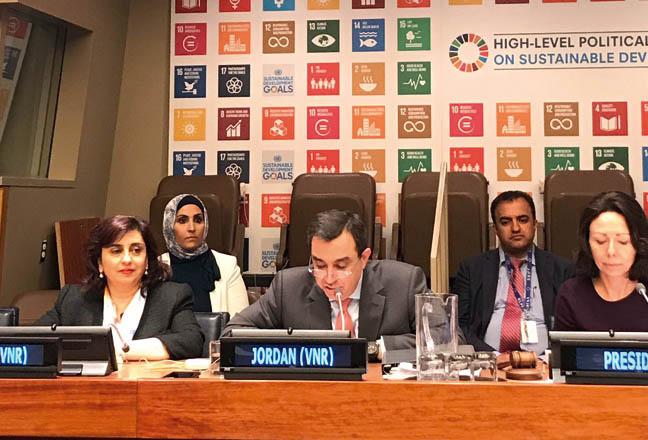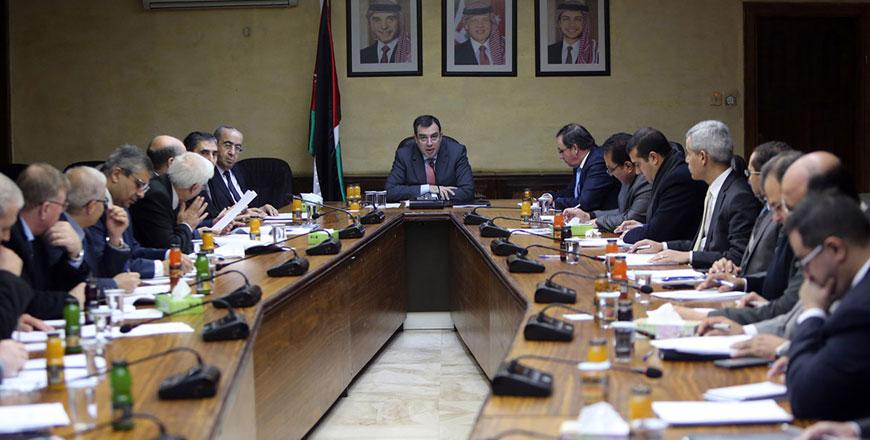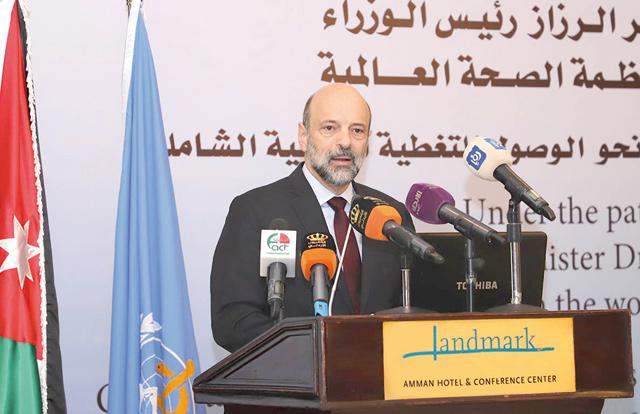You are here
‘2030 Sustainable Development Agenda top priority for Jordan’
By JT - Jul 20,2017 - Last updated at Jul 20,2017

Minister of Planning and International Cooperation Imad Fakhoury has presented Jordan’s National Voluntary Review Report on the Sustainable Development Agenda 2030 at the High-level Political Forum on Sustainable Development at the UN (Photo courtesy of the Planning Ministry)
AMMAN — Minister of Planning and International Cooperation Imad Fakhoury has presented Jordan’s National Voluntary Review Report on the Sustainable Development Agenda 2030 at the High-level Political Forum on Sustainable Development at the UN in New York, according to a ministry statement on Wednesday.
Fakhoury, who is also the chairman of the Higher National Committee for Sustainable Development, said that Jordan is on the “right path” in implementing the sustainable development agenda 2030, the statement said.
Jordan is unable to achieve comprehensive and sustainable economic, social and environmental development on its own, Fakhoury said, given the “enormous pressure” it is facing on its infrastructure and services due to conflicts in the region and the influx of large numbers of refugees, which poses a real challenge to achieving sustainable development goals by 2030.
Therefore, the provision of continuous and medium-term financial and technical support to Jordan is “more important than ever before” to protect the development gains, the minister added.
Jordan is working on tapping into and leveraging traditional and non-traditional sources of finances including: ODA, public and private, PPPs, Islamic financing, as well as sub-national, national and global finance to support long-term investments needed for the new sustainable development agenda, said Fakhoury.
The minister stressed that the process of developing and enhancing the role of Jordan’s resilience is achieved through a “strong commitment to dialogue and reform, based on a comprehensive and advanced process, based on effective citizenship, empowering Jordanian citizens, creating new opportunities and raising the standard of living for them”.
He noted that the adoption of the Agenda for Sustainable Development 2030 came at a crucial moment, where the region faces unprecedented instability and waves of refugees and displaced persons, which requires concerted efforts at the global level to overcome these challenges.
“There is no development without security and peace,” he said.
He said that Jordan is moving forward on the path of political reform, where it has been working on the development of its electoral laws and policy. The Kingdom is currently preparing to hold local elections for the first time and to elect governorate councils as part of the decentralisation process.
Jordan has also adopted the Integrity, Ombudsman and Anti-Corruption Charter as part of its efforts to promote transparency and good governance and to combat corruption, according to the statement.
Jordan continues to implement comprehensive judicial reforms on the basis of the recommendations of the committee to develop the judiciary and enhance the rule of law, he added.
Fakhoury said that Jordan has set a 11-point road map to achieve sustainable development which includes: bridging the gender gap, enhancing monitoring and evaluation systems and comparing objectives, targets and indicators, among others.
In light of Jordan’s hosting of refugees, the minister urged the support to be expanded.
He called on the donor countries to fulfill the commitments they pledged in the Jordan Compact adopted at the London Conference in 2016 and the Jordan Output Document adopted in Brussels in 2017 to fund the Jordan Response Plan.
For her part, MP Wafaa Bani Mustafa said that parliament plays a key role in achieving the goals of sustainable development through adopting a legislative plan to develop the legal, and legislative environment in partnership with the government.
The Chairperson of the Civil Coalition for Sustainable Development Asma Khadr stressed that civil society is a key partner in all development efforts.
It contributes to the identification of priorities, monitors, monitors awareness, builds capacities and contributes to all national efforts, she added.
Related Articles
AMMAN — Jordan’s sustainable development goals could be threatened by the consequences of regional conflicts, a meeting of the Higher Nation
AMMAN — The Higher National Committee for Sustainable Development, chaired by Minister of Planning and International Cooperation Imad Fakhou
AMMAN — Prime Minister Omar Razzaz on Saturday said that the government is committed to realising comprehensive health insurance, which come














